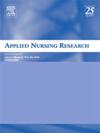COVID-19 期间护理教育后的毕业生出路
IF 2.7
4区 医学
Q1 NURSING
引用次数: 0
摘要
COVID-19 大流行对全球人口产生了许多影响。由于大流行病的性质,卫生部门,特别是护理部门受到的影响尤为严重。护理行业不得不应对大流行病的影响以及相关的政府干预措施,而护理专业学生的就业前景、对培训的满意度以及继续深造的意愿也发生了变化,所有这些都影响了护理教育的可持续性。本研究旨在分析澳大利亚职业教育与培训(VET)项目护理毕业生的教育成果。评估的影响包括就业、满意度和毕业后的继续深造。本文基于对 2018 年至 2022 年(含 2022 年)澳大利亚职业教育结业生进行的五波大型综合调查的分析。我们针对就业、满意度和继续深造的结果分别建立了三个逻辑回归模型,以估算年份与教育领域(包括护理文凭、所有其他卫生资格证书和所有其他资格证书)之间相互作用的预测边际。我们的研究结果表明,在大流行病期间和之后,这些毕业生的就业情况明显改善,满意度也有所提高,这表明该行业正在应对可持续发展的挑战。有趣的是,继续深造的入学率在大流行早期显著上升之后,随着危机的缓解又恢复到了大流行之前的水平。本文章由计算机程序翻译,如有差异,请以英文原文为准。
Graduate pathways following nursing education during COVID-19
The COVID-19 pandemic has exerted many effects on populations worldwide. Due to the nature of the pandemic, health and specifically nursing sectors have been particularly impacted. While the nursing sector had to grapple with the impact of the pandemic as well as associated government interventions, nursing students have experienced changes in their job prospects, satisfaction with their training and their propensity to engage in further studies, all impinging on the sustainability of nursing education. This study aims to analyze educational outcomes for nursing graduates undertaking VET (vocational education and training) programs in Australia. Impacts assessed include employment, satisfaction, and further study after completion. The paper is based on analysis of five large waves of a comprehensive survey of Australian vocational education completers, from 2018 to 2022 inclusive. We develop three separate logistic regression models for the outcomes of employment, satisfaction, and enrollment in further study in order to estimate the predictive margins for the interactions between year and field of education, including the Diploma of Nursing, all other health qualifications, and all other qualifications. Our results show that these graduates saw significantly improved employment outcomes and heightened satisfaction during and after the pandemic, pointing to the sector meeting sustainability challenges. Interestingly, enrolment in further studies, after a notable increase earlier in the pandemic, returned to pre-pandemic levels as the crises abated.
求助全文
通过发布文献求助,成功后即可免费获取论文全文。
去求助
来源期刊

Applied Nursing Research
医学-护理
CiteScore
4.50
自引率
0.00%
发文量
65
审稿时长
70 days
期刊介绍:
Applied Nursing Research presents original, peer-reviewed research findings clearly and directly for clinical applications in all nursing specialties. Regular features include "Ask the Experts," research briefs, clinical methods, book reviews, news and announcements, and an editorial section. Applied Nursing Research covers such areas as pain management, patient education, discharge planning, nursing diagnosis, job stress in nursing, nursing influence on length of hospital stay, and nurse/physician collaboration.
 求助内容:
求助内容: 应助结果提醒方式:
应助结果提醒方式:


